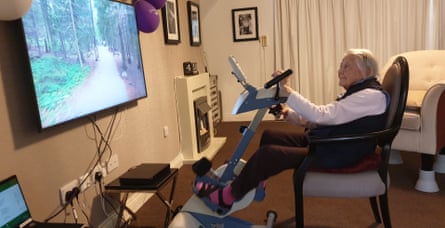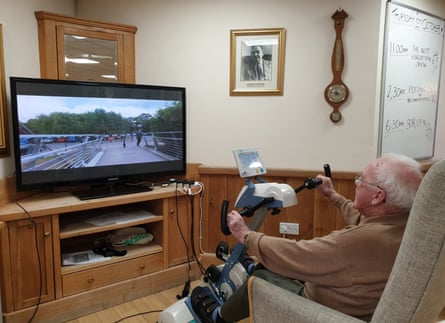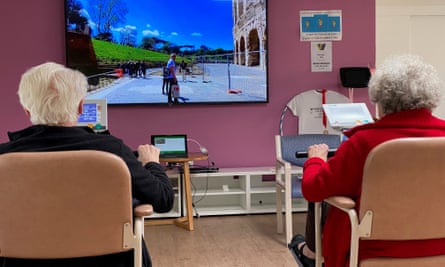Joy Small and Cathrine Myhr have never met, live in care homes 1,000 miles apart – but are challenging each other in a gripping sporting stand-off.
“I’m going to win the medal for female world champion,” says Small, 92, from her care home in Newbury. “I’ve always been very competitive.” Myhr, 56, contesting the same medal from a centre in Oslo for seniors and those with learning difficulties, will see about that. “I compete from 8am to 3.30pm every day,” she says. “I even eat my meals on the go.”
The two women are taking part in a global, static cycling competition that has inspired thousands of older people to cycle the equivalent of hundreds of thousands of kilometres without leaving their care homes.

Gwyneth Nisbet for example hasn’t been able to walk since she came out of hospital two years ago and hasn’t left her care home since lockdown. But over the past few months, the 81-year-old has cycled hundreds of miles, revisiting the countries she and her husband went to when they were younger.
“Lockdown is horrific but seeing these countries triggers all sorts of memories,” she says. “I have a little happy cry then I ring up my husband and we reminisce together.”
Bill Ireland OBE, was a fighter pilot in 1956. Now in a care home in Warwickshire, he is seething because as we speak, he slips from number 7 in the competition’s global ranking to number 8.
“Some of the competitors cover so many miles that they must keep cycling in their sleep!” he says, exasperated. “But it motivates me. I do two hours before breakfast. I love the competitive nature of it. I also love the discipline. I’ve always lived by discipline.”

The Road Worlds for Seniors competition, now in its third year, aims to reduce immobility of older people in care home settings, especially among those with dementia.
Immobility is a serious issue among care home residents. In just one week, immobile older people can lose 10-12% of their muscle mass and reduce their circulatory volume – which can cause internal organs to stop working – by 25%.
Quick GuideWhat is the Upside?
Show
Ever wondered why you feel so gloomy about the world - even at a time when humanity has never been this healthy and prosperous? Could it be because news is almost always grim, focusing on confrontation, disaster, antagonism and blame?
This series is an antidote, an attempt to show that there is plenty of hope, as our journalists scour the planet looking for pioneers, trailblazers, best practice, unsung heroes, ideas that work, ideas that might and innovations whose time might have come.
Readers can recommend other projects, people and progress that we should report on by contacting us at theupside@theguardian.com
Reversing the damage is not straightforward: for every 10 days of bed rest in hospital, the equivalent of 10 years of muscle ageing occurs in people over 80 years old. That muscle can only be rebuilt at a rate of 6% a week. If older people are immobile for just 3 to 5 weeks, they can lose the ability to stand. The best way to slow the loss of muscle mass and function is resistance training.
Which is where Motitech, a Norwegian startup launched in 2013 comes in. Founded by Jon Ingar Kjenes, it has developed specially-adapted exercise bikes that enable users to revisit familiar places from their childhoods and other important points in their lives, through a video projection that can play over 2,000 videos from 400 countries while they pedal.
Kjenes happily admits it’s a simple idea but homes report immediate and transformative benefits among residents: less anxiety, frustration and confusion. Better sleeping and eating patterns. Less need for painkillers and other medicines. And crucially, more activity.
Kjenes tells the tale of an elderly dementia sufferer with a double hip fracture. “When she came back from rehab, she was so aggressive and affected that doctors said she would never walk again,” he says. “But after 6 months of using these machines, she was able to walk unaided.”
That, he says, was the inspiration he needed to ditch his day job as a commercial TV producer and try to get his bikes into care homes across the world.
Motitech is now firmly established across the Nordic countries, Australia, Canada, Malaysia, Hong Kong, Europe and also in 24 homes across the UK.
He started the competition in 2017. “We very often look at seniors as having long term care needs but people with disabilities have abilities too,” he says. “The Road Worlds competition was a big thing in Norway already. We started thinking it might be highly effective to think about Seniors as athletes and their staff as their team, who treats them like an athlete, with close attention to diet, discipline, team spirit, health and medication.”
The collaboration of seniors is, say the homes, remarkable: octogenarians cheer nonagenarians from across the other side of the world. At the same time, homes report an increase in staff morale and quality of care.
“I love sitting with the residents when they’re on the bikes,” says Georgina Cliff, fitness instructor at the Belong care village in Newcastle-under-Lyme. “Residents with dementia truly believe they’ve had an outing. It unlocks a little bit of their brain and the memories it triggers, help staff to get to know residents as interesting, individual people,” she adds. “That makes our job more personal and rewarding.”
In Västängsgården care home in Sweden, Ida Nilsson, head of activity, incorporates whole events into the journeys of resident Mai Grundel.
“Mai cycled through Norway last week, so to make it fun, we had Norwegian waffles and Norwegian cheese,” said Andersson. “When she was in Italy, we had Italian coffee and biscotti.”
Static bikes in gyms can feature similar technology. But that, said David Cochrane, CEO of Harbison care home in Australia, is a moot point: these older people come from a generation where gyms didn’t feature.

“We’d been failing to get our residents to exercise in our gym for years,” he said. “These bikes, in contrast, are busy all the time but there’s not a single resident who comes back to do it again because it’s exercise. They come because the screens take them away from their day-to-day setting. It make the experience social and it triggers memories.”
He tells the tale of 84-year-old Doreen Taylor, a resident who can’t walk at all. “She did 4.2km this morning from her chair in half an hour,” he said. “The first shot she had on the screen was of her front door. You couldn’t get her off the machine after that. She was crying tears of joy.”
This article was amended on 5 October 2020 to clarify that the Belong care village is in Newcastle-under-Lyme. An earlier version had referred only to Newcastle.
This article is part of a series on possible solutions to some of the world’s most stubborn problems. What else should we cover? Email us at theupside@theguardian.com
